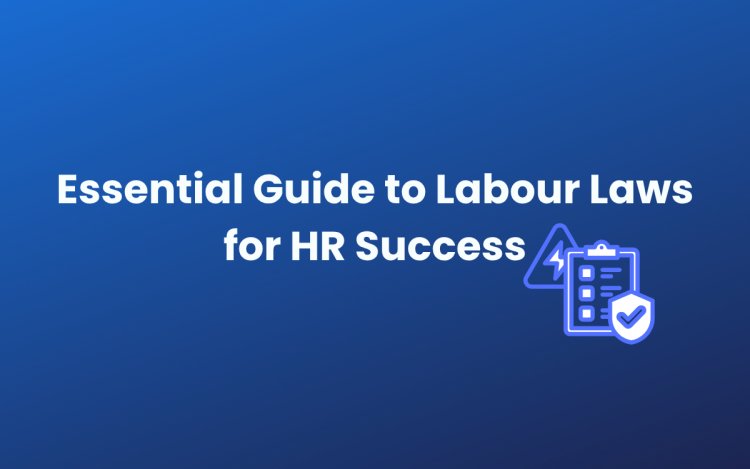Are your HR operations truly aligned with India’s evolving labour regulations? For human resource professionals, understanding these laws isn’t just a compliance formality—it’s essential for fostering a fair, legally sound, and high-performing workplace.
Labour laws serve as a legal framework governing employment relationships, addressing wages, safety, equity, and dispute resolution. With India’s new Labour Codes on Wages, Social Security, Industrial Relations, and Occupational Safety, HR plays a pivotal role in ensuring organizations remain compliant and ethically sound.
Keeping up with labour law developments equips HR with the tools to reduce risks, enhance employee trust, and lead workforce strategies in a compliant and strategic manner.
Why Labour Law Knowledge Is Non-Negotiable for HR Professionals
1. Compliance Isn’t Optional
-
Labour laws govern every phase of the employee journey—recruitment, onboarding, compensation, promotions, and terminations.
-
Errors such as employee misclassification or omitted statutory notices can result in significant penalties.
-
Adhering to labour regulations ensures smoother HR processes and avoids regulatory pitfalls.
2. Minimizing Legal Risk Exposure
-
HR serves as the frontline defender against employment-related legal risks.
-
Informed HR teams can prevent missteps that may invite litigation or government intervention.
-
Maintaining compliance-ready documentation helps during audits and disputes.
3. Preventing Discrimination and Harassment
-
Laws like the POSH Act and Equal Remuneration Act set standards for fair treatment and workplace equity.
-
HR must uphold unbiased hiring practices, enforce anti-discrimination policies, and manage complaints effectively.
-
This safeguards both employees and the organization from legal and ethical violations.
4. Ensuring Fair Pay and Benefits
-
HR must stay informed about region-specific rules regarding wages, leaves, and statutory benefits.
-
Compliant compensation structures help prevent wage disputes and reduce legal liability.
-
Accurate benefits administration enhances transparency and satisfaction.
5. Protecting Employee Rights
-
Key rights relate to workplace safety, privacy, leave, and grievance redressal.
-
HR's legal awareness ensures these rights are preserved, fostering a culture of mutual respect.
-
Trust in HR increases when employees see their rights being protected.
6. Handling Disputes Legally and Fairly
-
HR professionals must manage conflicts by adhering to due legal procedures under the Industrial Employment (Standing Orders) Act.
-
Proper disciplinary frameworks help resolve disputes before they escalate.
-
Early, lawful intervention mitigates risks of labour court involvement.
7. Conducting Lawful Terminations
-
HR must ensure legal due process is followed when terminating employment.
-
This includes notice periods, documentation, final settlements, and compliance with the Industrial Disputes Act.
-
Proper handling prevents wrongful termination claims and maintains company reputation.
8. Supporting Business Strategy
-
In events like mergers, expansion, or downsizing, HR must navigate multiple state-specific laws.
-
Labour law awareness is critical for legal due diligence during organizational changes.
-
It ensures compliance while protecting employee rights and managing reputational risk.
How HR Professionals Can Learn Labour Laws Effectively
1. Take Courses and Get Certified
-
Opt for HR and labour law certifications such as SHRM, HRCI, or region-specific courses.
-
Focus on programs offering practical insights into compliance, contracts, and audits.
-
Select courses aligned with Indian legal systems for maximum applicability.
2. Stay Informed on Legal Updates
-
Follow labour ministry portals and HR legal bulletins.
-
Subscribe to newsletters like Labour Law Reporter, SHRM India, or legal firm digests.
-
Track new legislation, case law, and regulatory interpretations.
3. Attend Industry Events
-
Participate in seminars, webinars, and conferences featuring employment law experts.
-
Use panel discussions and Q&A sessions to address specific compliance challenges.
-
Networking enables experience sharing and exposure to real-world best practices.
4. Consult Legal Professionals
-
Engage regularly with in-house legal teams or employment law advisors.
-
Review internal policies for legal gaps or outdated practices.
-
Seek expert advice during sensitive HR processes like investigations or layoffs.
5. Use Digital Resources Wisely
-
Refer to government labour portals and verified HR platforms.
-
Study case law, best practices, and visual explainers relevant to your region.
-
Keep a curated list of trusted sources for daily or weekly review.
6. Learn Through Experience
-
Gain exposure through involvement in internal compliance reviews and investigations.
-
Draft or revise HR policies with legal advisors.
-
Real-world case handling improves your grasp of practical labour law applications.






